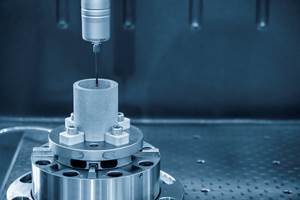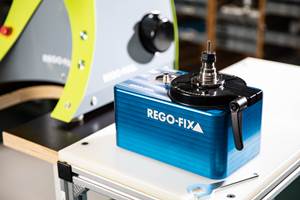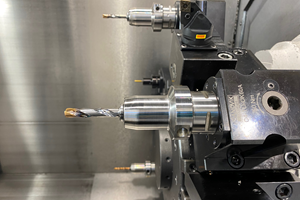Drill Cuts Cycle Time, Costs By More Than 60 Percent
This supplier of engineered gear and drive systems had problems with tool life and lengthy cycle times when drilling holes on a large drive shaft made of forged alloy steel. A new drilling system resolved these issues and exceeded the company's expectations.┬а
Share





Oerlikon Fairfield Drive Systems supplies engineered gear and drive systems to off-highway and industrial equipment manufacturers from around the world. As a branch of Oerlikon, the Lafayette, Indiana-based company specializes in the design, development and manufacture of custom gear and drive assemblies for numerous industries, including construction, mining, rail, transportation and agriculture.
Fairfield vies with both foreign and domestic machine shops to stay at the forefront of the industry. To remain competitive, the 88-year-old company constantly seeks ways to streamline its production process. When Fairfield began experiencing issues with producing drive shafts for mining equipment, the company realized that finding an effective solution to its problematic production process would be vital to its success.
The problem involved a large drive shaft constructed of forged alloy steel. The company ran this application on a Carlton Radial Arm Drill with water-soluble coolant using a rotary coolant adaptor (RCA). The operation required drilling 10-inch deep, 0.787-inch diameter holes. To machine the holes, the company used a cobalt twist drill and a fixture plate with 0.787-inch bushings in a process that took 17 minutes, 33 seconds. This lengthy cycle time limited productivity and drove up costs, leading the company to search for a quicker solution.
Fairfield consulted Allied Machine & Engineering Corporation. Allied field sales engineer Chad Longstreth, along with Indianapolis-based distributor Carbide, Cutting Tools, and Abrasives Inc. (CCA), brought in AlliedтАЩs GEN2 T-A drilling system to address the companyтАЩs concerns. Since this implementation, the company reports that the 0.787-inch drill insert exceeded its expectations.
Featuring a chrome helix holder, the new insert uses a bushing fixture for guidance when the tool transitions from one set of holes on the top of the part to another set of holes on the bottom.
тАЬThe bushing simply keeps the holes in line,тАЭ Mr. Longstreth explains.
Another feature designed to maintain hole straightness is the insertтАЩs custom notch-point geometry. The insertтАЩs design, coupled with its custom AM200 coating, increase tooling life and drill stability, the manufacturer says. In addition, the tool is designed to provide smooth breakouts in through-holes while improving chip formation.
Addressing the benefits of the GEN2 T-A tooling, Mr. Longstreth explains, тАЬThe previous process was very tedious, and tool life was minimal. Additionally, the tool required frequent re-sharpening, which detracted from machining and therefore added to production costs.тАЭ
With the capability to drill 24 holes before wear sets in, the new drill is an obvious upgrade from the previous tool, which lasted for only ten holes, the company says. The tool reduced the operationтАЩs cycle time by nearly 64 percent to only 6 minutes and 35 seconds.
This cycle-time reduction and longer tool life has created a substantial cost savings for Fairfield. The company lowered its costs by roughly 63 percent when drilling 600 holes with the new tool, a savings that amounted to thousands of dollars.
тАЬHaving the ability to make it through an entire part without changing the drilling insert maximizes uptime and minimizes costs,тАЭ Mr. Longstreth concludes.
Related Content
Parts and Programs: Setup for Success
Tips for program and work setups that can simplify adjustments and troubleshooting.
Read MoreBriquetting Manufacturer Tools Up for Faster Turnaround Times
To cut out laborious manual processes like hand-grinding, this briquette manufacturer revamped its machining and cutting tool arsenal for faster production.
Read MoreFive Common Mistakes Shops Make with ER Collets (And How to Prevent Them)
Collets play a crucial role in the machining process, so proper tool assembly and maintenance is important. Here are five potential pitfalls to avoid when using ER collets.
Read MoreForm Tapping Improves Tool Life, Costs
Moving from cut tapping to form tapping for a notable application cut tooling costs at Siemens Energy and increased tool life a hundredfold.
Read MoreRead Next
Last Chance! 2025 Top Shops Benchmarking Survey Still Open Through April 30
Don’t miss out! 91╩╙╞╡═Ї╒╛╬█'s Top Shops Benchmarking Survey is still open — but not for long. This is your last chance to a receive free, customized benchmarking report that includes actionable feedback across several shopfloor and business metrics.
Read MoreAMRs Are Moving Into Manufacturing: Considerations for Implementation
AMRs can provide a flexible, easy-to-use automation platform so long as manufacturers choose a suitable task and prepare their facilities.
Read MoreMachine Shop MBA
Making Chips and 91╩╙╞╡═Ї╒╛╬█ are teaming up for a new podcast series called Machine Shop MBA—designed to help manufacturers measure their success against the industry’s best. Through the lens of the Top Shops benchmarking program, the series explores the KPIs that set high-performing shops apart, from machine utilization and first-pass yield to employee engagement and revenue per employee.
Read More





















